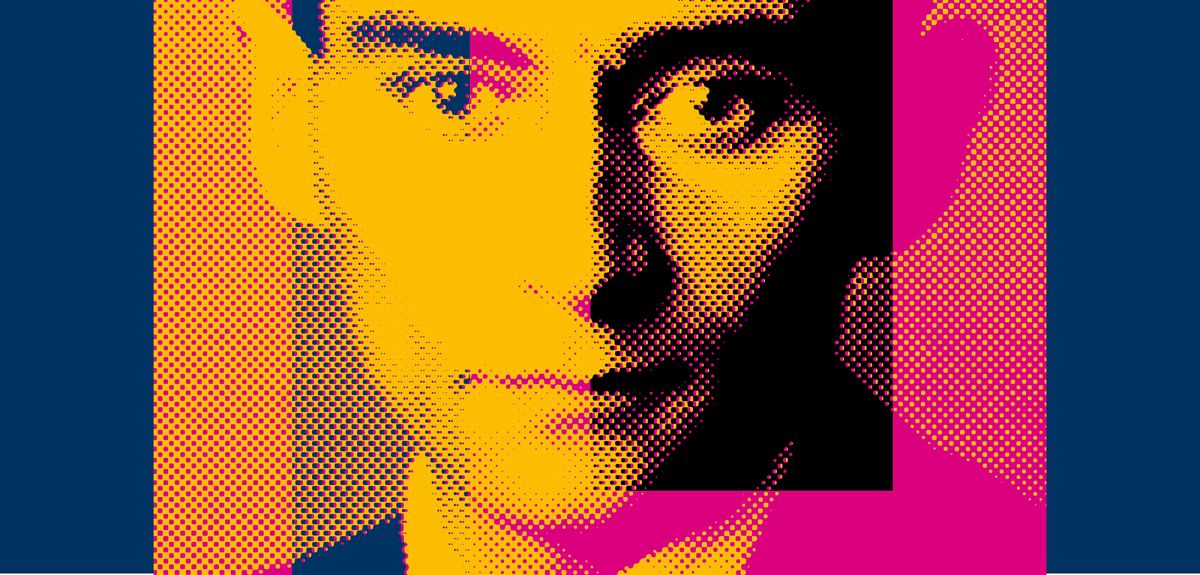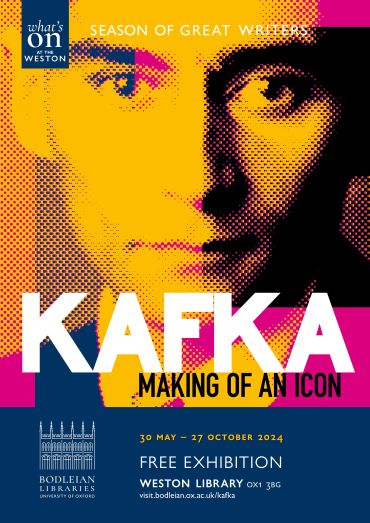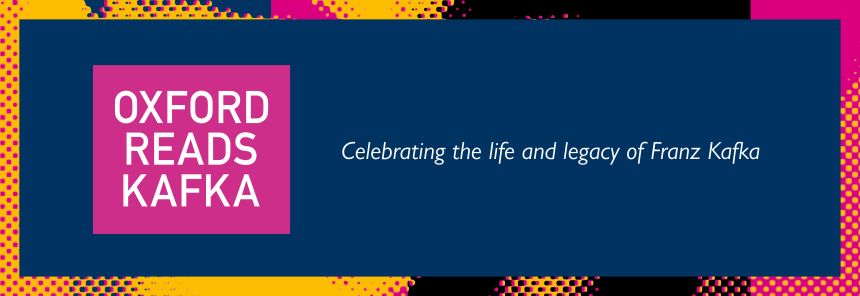
Oxford Kafka 2024
A programme of University-wide events and activities will celebrate the literary works and enduring global legacy of Franz Kafka and mark the centenary anniversary of the author’s untimely death.
Franz Kafka (3 July 1883 – 3 June 1924) is widely regarded as one of the major figures of 20th-century literature.
Oxford University is encouraging awareness of the enduring global legacy of Kafka through a variety of academic and cultural activities for university and public audiences.
The programme will include a free public exhibition Kafka: Making of an Icon, public installations, talks, dance and theatre, and to mark the 100-year anniversary of Kafka’s death on Monday 3 June, a collective public reading of Metamorphosis will be held at the Sheldonian Theatre.
Richard Ovenden, Bodley’s Librarian and Director of Gardens, Libraries and Museums at Oxford University, said: ‘100 years after his death, younger generations continue to learn from and be fascinated by Kafka’s life and works – many of which are held in the Bodleian archives. We therefore saw this as a perfect opportunity to celebrate his legacy and enduring influence.’
An English translation of Kafka’s Metamorphosis by David Wyllie is available for free at Project Gutenberg in multiple formats:
Access e-book formats here
Access audio versions here
Find out more about the programme of events below...
Upcoming events
Kafka in Mind
Wednesday 25 September, 2pm-4pm
Richard Doll Lecture Theatre, Richard Doll Building, Headington
As part of the Oxford Kafka celebrations and hosted by Oxford Health Biomedical Research Centre, we welcome you to a conversation on Kafka’s work related to Mind and Mental Illnesses. You will hear from experts in literature, Kafka, arts, psychology, mental health, and multiple forms of research and practice including Professor Carolin Duttlinger who leads a new Arts and Humanities Research Council programme on Kafka.
Free event. Reserve tickets here: Kafka in Mind Tickets.
Find out more at: Upcoming Events – NIHR Oxford Health Biomedical Research Centre.
Read more about the speakers.
Exhibitions
Kafka: Making of an Icon
30 May–27 October, 2024
ST Lee Gallery, Weston Library
Free admission
Find out more: Kafka: Making of an Icon | Visit the Bodleian Libraries (ox.ac.uk)
 Kafka: Making of an Icon exhibition
Kafka: Making of an Icon exhibition
The exhibition will feature materials from the archives of the Bodleian Libraries, which hold the majority of Franz Kafka's papers, including literary notebooks, drawings, diaries, letters, postcards, glossaries, and photographs. Notably, the notebooks in the archive include the original manuscripts of two of Kafka’s unfinished novels, Das Schloss (The Castle) and Der Verschollene (America), as well as a number of short stories.
Using this rich archive, the exhibition not only sets Kafka in the context of his life and times but also shows how his own experiences nourished his imagination. His notebooks show how his travels in Western Europe enabled him to practise descriptive writing, while his readings strengthened his fascination with remote spaces and made him aware of European colonialism.
Special events
 Oxford Reads Kafka will include a large-scale, collective public reading of Metamorphosis at the Sheldonian Theatre
Oxford Reads Kafka will include a large-scale, collective public reading of Metamorphosis at the Sheldonian TheatrePublic readings
Monday 3 June, 2024 (6pm-7.30pm)
Sheldonian Theatre
For tickets and further information, please visit: Oxford Reads Kafka | Visit the Bodleian Libraries
To mark the 100-year anniversary of Kafka’s death on Monday 3 June, a large-scale, collective public reading of Metamorphosis will be held at the Sheldonian Theatre, involving notable literary figures, representatives from a range of student societies and SU leaders.
Talks
Four Oxford professors have created a lecture and events programme exploring Kafka’s legacy from their different disciplinary perspectives. Professor Karen Leeder (Humanities) will focus on Kafka’s writing and legacy, questions of race and his sense of humour. Professor Eben Kirksey (Social Sciences) will focus on Kafka and disability. Professor Tim Coulson (Life Sciences) will focus on Kafka and insects. Professor Helen McShane (Medical Sciences) will focus on Kafka as a sufferer of tuberculosis.
A wide-ranging reading list inspired by these four perspectives can be found on Oxford Reading Lists Online.
Insects and the Psychology of Disgust and Repulsion
Thursday 23 May, 7pm-8pm
Oxford University Museum of Natural History
Panel discussion: Humans have a widely held disgust for insects. Is this disgust innate, or even universal? Are there good evolutionary reasons for it? Or is it just learnt behaviour? And how did Franz Kafka exploit this sense of disgust so successfully in Metamorphosis?
Find out more and book tickets: Insects and the Psychology of Disgust and Repulsion | Oxford University Museum of Natural History
Hunger Artistry: Kafka and the Art of Starvation
Thursday 30 May, 5pm-6pm
Sir Victor Blank Lecture Theatre, Weston Library
In Kafka’s Metamorphosis, when the starving Gregor hears music he glimpses the way ‘to the unknown nourishment he longed for’. After his emaciated body is disposed of, his sister stretches her young body into the sun, full of life energy. But this is not the only story in which Kafka deals powerfully with hunger, art and change. His The Hunger Artist takes its cue from the real exhibition fasting artists who, until the early years of the 20th century, would starve themselves for the entertainment of paying audiences. The story has been translated into theatre, comic form, animation and a new ballet has been commissioned as part of the Oxford Kafka celebrations. It has also inspired writers, artists and academics to explore the politics and art of starvation in the 20th century and beyond. Join Peter Boxall, Alys Moody, Ankhi Mukerjee, and Meindert Peters, who will be in conversation with Karen Leeder to think about how Kafka and the art and literature that comes after him can be read at a time when eating disorders have reached epidemic proportions, hunger-strikes are a political tool and starvation is used as a weapon of war.
This event is free but booking is essential. A number of tickets are reserved for alumni; please use the code 'alumni2024'. Book online.
CRISPR Gene Editing and Metamorphosis: a panel discussion
Monday 3 June, 10am-11am
Sir Victor Blank Lecture Theatre, Weston Library
Find out more and book tickets here: Kafka and Disability | Visit the Bodleian Libraries
'Time traveling with Gregor Samsa, or what you can do with six legs' a keynote address on disability with Professor Rosemarie Garland Thomson
Monday 3 June, 2pm-3pm
Sir Victor Blank Lecture Theatre, Weston Library
A keynote lecture from prominent disability scholar Rosemarie Garland-Thomson.
Find out more and book tickets here: Kafka and Disability | Visit the Bodleian Libraries
Extraordinary Bodies, Disability Justice, and Metamorphosis: a panel discussion
Tuesday 4 June, 10am-11am
Sir Victor Blank Lecture Theatre, Weston Library
Find out more and book tickets here: Kafka and Disability | Visit the Bodleian Libraries
Display and talk on insects by entomologist Dr George McGavin
Wednesday 5 June, all day
Oxford University Museum of Natural History
Monstrosities and Metamorphosis in More-Than-Human Worlds
Wednesday 5 June, 2pm-3pm
Sir Victor Blank Lecture Theatre, Weston Library
Accompanying this lecture will be a site-specific installation by artist Tessa Farmer.
Find out more and book tickets here: Kafka and Disability | Visit the Bodleian Libraries
Tuberculosis: vaccines, diagnostics and experience
Wednesday 5 June, 6pm-7pm
Sir Victor Blank Lecture Theatre, Weston Library
Professor Helen McShane and the NIHR Oxford Biomedical Research Centre, a partnership between the OUH NHS Foundation Trust and the University of Oxford, will focus on Kafka as a sufferer of TB. The session will cover vaccines (Helen McShane), diagnostics (Philip Fowler) and a TB patient will share their experience with the disease.
Find out more and book tickets here: Tuberculosis: vaccines, diagnostics and experience | Eventbrite
Franz Kafka and the Truths of Leadership - 'In Conversation' with the author Leah Tomkins with LBC Journalist Shelagh Fogarty
Friday 7 June, 5pm-7pm
Chen Kar Sun Digital Hub, Jesus College
Dance and Theatre
Kafka's Ape and Words and Music
May 10-12 (7pm and 9pm)
Old Fire Station, Oxford
Two award-winning shows translate Kafka's dark parable of un-belonging for the modern day. Kafka's story A Report for an Academy finds its way into blistering explorations of race and migration, and grownup reflections on aging and humanimal agency, at the same time metamorphising prose into drama and stand-up comedy. Kafka as you've never seen or heard him before.
Book tickets here, including a special reduced ticket for the double bill.
Arthur Pita’s A Hunger Artist
Preview: Monday 3 June (6pm)
Tuesday 4 June (4pm and 7.30pm)
Wednesday 5 June (6pm)
Old Fire Station, 40 George Street, Oxford, OX1 2AQ
Tickets £5-20
Following their award-winning production of Metamorphosis (London, New York, Sky TV), director-choreographer Arthur Pita reunites with dance virtuoso Edward Watson and composer-musician extraordinaire Frank Moon, this time welcoming the renowned rebel chanteuse Meow Meow. Together, they delve into Kafka’s final and seminal work with a new adaptation of A Hunger Artist, seamlessly intertwining dance, song, and intrigue into an enthralling, immersive spectacle.
Confined within a locked, straw-lined cage, Watson immerses himself in the role of the ‘Hunger Artist,’ enduring fasts lasting up to 40 days. The bewitching Meow Meow takes command of the stage as the audacious ‘Impresario,’ drawing crowds to witness this ‘art’, amidst unfolding complexities. Meanwhile, Frank Moon’s eclectic score surrounds the audience, pulling them deeper into the experience with every breath. These visionary artists inject new life into Kafka’s haunting and obscure narrative, exploring sacrifice, obsession, and the relentless pursuit of artistry.
Presented by the Cultural Programme in association with The Royal Ballet and the Oxford Kafka Research Centre.
Supported by The Abderrahim Crickmay Charitable Settlement, The Arts and Humanities Research Council, TORCH (The Oxford Research Centre in the Humanities), HEIF (Higher Education Innovation Fund), and the New College Ludwig Fund.
Find out more and book tickets: Arthur Pita’s: A Hunger Artist
Music
Kaleidoscope Chamber Collective: Transfigured
Friday 24 May
Pre-Concert Talk: 6pm-6.45pm
Concert: 7.30pm
Sheldonian Theatre, Broad Street, Oxford, OX1 3AZ
Tickets £5-£15
Kaleidoscope’s richly expressive programme explores themes of metamorphosis and transformation through two of the most thrilling chamber works in the repertoire. Francesca Chiejina (soprano), Elena Urioste (violin), Savitri Grier (violin), Juan-Miguel Hernandez (viola), Edgar Francis (viola), Laura van der Heijden (cello), Tony Rymer (cello), Philip Nelson (Double Bass).
- Alexander Zemlinsky – Maiblumen blühten überall for soprano and string sextet
- Richard Strauss – Metamorphosen (arr. Rudolf Leopold for string septet)
- Alma Mahler – Four Songs (arr. Tom Poster for soprano and string sextet)
- Arnold Schoenberg – Verklärte Nacht for string sextet, Op. 4 Schoenberg’s
Verklärte Nacht is an impassioned depiction of a couple whose lives are transfigured as they walk through the night, while Richard Strauss’s Metamorphosen (in its string septet version) is a heart-rending reaction against the destruction of European culture and heritage in the Second World War. Fast-rising star soprano Francesca Chiejina joins for some exquisite music for voice and strings, Zemlinsky conjures shimmering textures in Maiblumen blühten überall, while four of Alma Mahler’s songs are heard here in sumptuous chamber arrangements by Tom Poster. This is an evening of emotional extremes, of feverish and ecstatic passions; we can’t wait to share the journey with you.
Pre-concert talk: Join us from 6pm for a free pre-concert talk Kafka and Music with Carolin Duttlinger. You will be offered the option to add a ticket to your basket when you purchase your ticket for ‘Transfigured’. Tickets for the talk will also be available on the door. Carolin is Professor of German at the University of Oxford and Co-Director of the Oxford Kafka Research Centre. An international Kafka expert, she has published four books on the author. She is currently leading a major new research project, ‘Kafka’s Transformative Communities’, which is funded by the Arts and Humanities Research Council and brings together academics and creative practitioners from a range of artforms and media.
Find out more and book tickets: Kaleidoscope Chamber Collective: Transfigured
Save the date...
October 12: Kafka at the Oxford International Song Festival. Morning: ‘Kafka’s Prague’. Public lecture by Professor Carolin Duttlinger; lunchtime concert: world premiere, Can Bilir, Missed Songs of Josefine; Late night concert, New College, Kurtág, Kafka Fragments. (Organised by the Oxford Kafka Research Centre.)
Outdoor event
Jitterbug
Friday 31 May – Sunday 2 June
University Parks (nearest entrance: Keble Gate off Parks Road)
Tickets: Free but booking for some events is required
Created and presented by award-winning producers Trigger (The Hatchling/PoliNations), in collaboration with The Cultural Programme, the ‘Jitterbug’ is an enormous 14-metre inflatable bug tent, which will be the setting for a free programme of activities with workshops and events for all ages.
From talks, yoga and crafting to storytelling hosted by the Story Museum and a drag cabaret extravaganza in the evening, the event also features a brand-new collaboration between Oxford-based MC Rawz and aerialist Julia Sparkle as well as an exclusive performance by international superstar, Meow Meow.
Celebrating Franz Kafka’s work Metamorphosis the concept for the ‘Jitterbug’ was created in conjunction with academics from the University of Oxford, some of whom will be appearing at the event. It is designed to highlight the importance of recognising beauty from within a person and forms part of the centenary celebrations for the writer, part of the ‘Kafka’s Transformative Communities’ project from the Kafka Research Centre: #OxfordKafka24.
Find out more and book tickets: Jitterbug - OXFORD iS (oxfordculturalprogramme.org.uk)
Book releases
- Metamorphoses: In Search of Franz Kafka by Dr Karolina Watroba will be published in May 2024.
- Kafka: Making of an Icon edited by Ritchie Robertson to accompany the exhibition of the same name at the Weston Library, published May 2024.
Other events
- Inaugural Annual Social Science Division EDI Lecture: Professor Rosemarie Garland Thomson (June 6, Weston Library. Please note the audience for this event is restricted to members of the University only). Find out more and register to attend at: Social Sciences Division Inaugural EDI lecture | Social Sciences Division (ox.ac.uk).
- Conference: Kafka Transformed (please note the audience for this event is academic/students): Kafka Transformed international conference with podium discussion at Wadham College. Launch of the newly formed Global Kafka Network, which will connect scholars and artists from around the world. (Organised by the Oxford Kafka Research Centre, September 18-20.)
 Expert Comment: Church-to-mosque conversions grab headlines, but is funding the real crisis?
Expert Comment: Church-to-mosque conversions grab headlines, but is funding the real crisis?
 Expert Comment: Four years of full-scale war and Ukrainian resistance continues
Expert Comment: Four years of full-scale war and Ukrainian resistance continues
 Oxford and Liverpool join forces to tackle global challenges
Oxford and Liverpool join forces to tackle global challenges